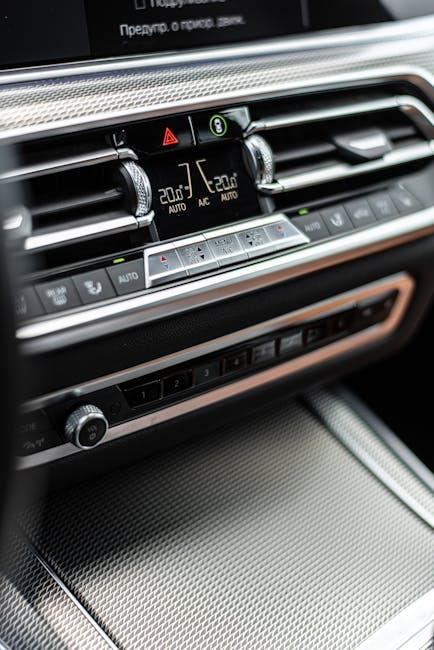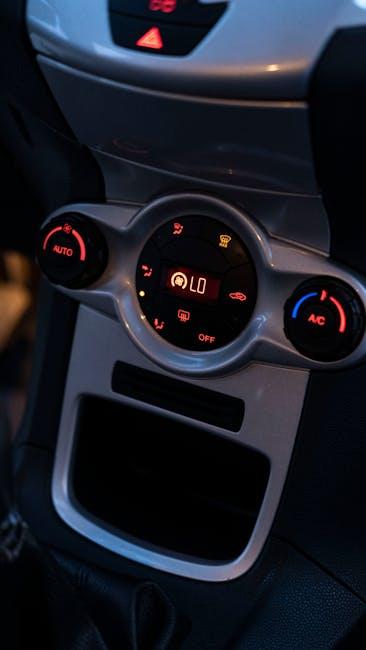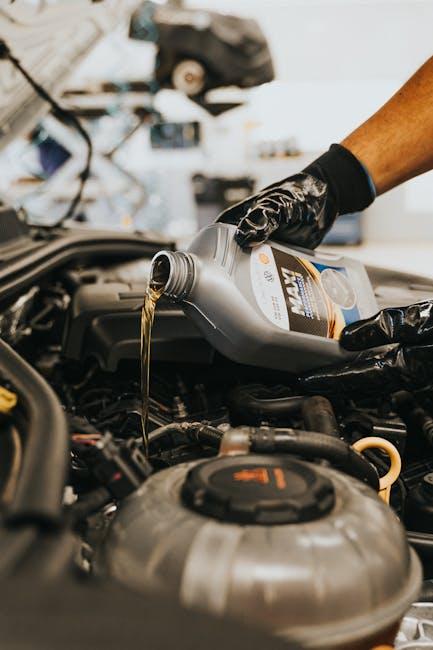As the summer sun blazes high and the asphalt shimmers under its relentless heat, our cars become more than just vehicles—they turn into sanctuaries of cool relief. But keeping that refreshing chill flowing smoothly requires more than just cranking up the dial. Proper care and maintenance of your car’s air conditioning system can spell the difference between blissful comfort and a steamy, stifling ride. In this article, we’ll explore practical and easy-to-follow tips to help you maintain your car’s AC, ensuring it performs at its best all summer long. Whether you’re embarking on a long road trip or navigating daily commutes, a well-tuned AC is your ultimate defense against the heat.
Table of Contents
- Maintaining Optimal Cooling Performance in High Temperatures
- Identifying Common AC Issues Before They Escalate
- Effective Cleaning Techniques for Your Car’s AC System
- Choosing the Right Refrigerant and When to Recharge
- Maximizing Energy Efficiency to Save Fuel During Summer
- Professional Servicing vs DIY Maintenance for Your Car AC
- Q&A
- Wrapping Up

Maintaining Optimal Cooling Performance in High Temperatures
When temperatures soar, your car’s air conditioning system works overtime to keep you comfortable. To sustain peak performance, regular maintenance is essential. Start by checking the AC refrigerant levels; low refrigerant can cause the system to underperform and strain the compressor. Additionally, inspect the condenser for debris like leaves or dust, which can block airflow and reduce cooling efficiency. Keep the exterior of your car shaded when parked, as this prevents the cabin and AC system from overheating, allowing the air conditioner to cool down your vehicle more quickly once you’re back on the road.
Another crucial step is replacing the cabin air filter regularly. A clogged filter restricts airflow, forcing the AC to work harder and consume more energy. You might also want to use a sunshade on your windshield to minimize interior temperatures, protecting the dashboard and electronics from heat damage. Below is a quick reference table to help you maintain your AC system effectively during hot weather:
| Maintenance Task | Recommended Frequency | Benefit |
|---|---|---|
| Check refrigerant levels | Every 6 months | Ensures efficient cooling |
| Clean condenser | Every 3 months | Improves airflow |
| Replace cabin air filter | Every 12,000 miles | Enhances air quality and airflow |
| Use sunshade | Daily when parked | Keeps interior cool |

Identifying Common AC Issues Before They Escalate
Recognizing early signs of AC trouble can save you from sweat-filled drives and costly repairs. Be on the lookout for unusual odors, unexpected noises, or weaker airflow than usual. These symptoms often hint at blockages, worn-out belts, or a refrigerant leak. Additionally, if your car’s interior temperature fails to reach the desired coolness, it might be time to inspect the compressor or check the coolant levels. Addressing these signs promptly helps maintain a comfortable cabin environment during scorching summer days.
- Strange smells: Musty odors may indicate mold or debris in the system.
- Hissing or rattling: Noises can mean loose components or refrigerant escaping.
- Inefficient cooling: Could be due to clogged filters or low refrigerant.
| Symptom | Possible Cause | Suggested Check |
|---|---|---|
| Weak Airflow | Clogged Cabin Air Filter | Replace Filter |
| Warm Air | Low Refrigerant | Recharge AC System |
| Unusual Noise | Faulty Compressor | Professional Inspection |

Effective Cleaning Techniques for Your Car’s AC System
Maintaining a fresh and efficient car AC system begins with regular cleaning to prevent buildup that can hinder performance and air quality. Start by changing the cabin air filter every 12,000 to 15,000 miles, or more often if you drive in dusty conditions. This simple step traps airborne contaminants and reduces unpleasant odors inside your vehicle. Next, clean the evaporator and condenser coils using specialized cleaners or have a professional service them annually. Ignoring these components can lead to mold growth and system blockages, which not only reduce cooling efficiency but may also cause system malfunctions.
DIY cleaning tips to keep your AC system running smoothly:
- Use an anti-bacterial spray designed for automotive air systems to sanitize vents.
- Run the fan on high with the windows down for 10 minutes before turning off the AC to dry moisture in the ducts.
- Inspect hoses and belts regularly for signs of wear or leakage.
| Component | Cleaning Frequency | Effect |
|---|---|---|
| Cabin Air Filter | Every 12,000-15,000 miles | Improves air quality & airflow |
| Evaporator Coils | Annually | Prevents mold & maintains cooling |
| Condensers | Annually or biannually | Enhances heat exchange efficiency |

Choosing the Right Refrigerant and When to Recharge
Maintaining your car’s cooling system means more than just turning the AC on full blast. Selecting the appropriate refrigerant is key for optimal performance and environmental safety. Modern vehicles typically use R-134a or the newer R-1234yf refrigerants, known for their efficiency and lower environmental impact. It’s crucial to consult your car manufacturer’s guidelines before topping up, as using the wrong type can harm your AC system or void warranties. Additionally, always seek a professional to handle refrigerant recharge, as improper handling can damage components or cause leaks.
Knowing when to recharge your AC refrigerant can save your comfort and prevent costly repairs. Signs like less cool air, strange noises, or visible leaks around the AC lines often indicate a shortage. To help you monitor your system’s status, refer to the simple checklist below:
- Reduced cooling efficiency: Air feels warmer despite settings.
- Hissing sounds: Potential leaks in refrigerant lines.
- AC compressor cycles frequently: System struggles to maintain pressure.
- Window fogging: Decreased humidity control.
| Symptom | Likely Cause | Recommended Action |
|---|---|---|
| Warm air blowing | Low refrigerant level | Recharge refrigerant |
| Unusual noises | Potential leaks or compressor issues | Inspect & repair by professional |
| AC runs but feels weak | System inefficiency | Check refrigerant & system tuning |

Maximizing Energy Efficiency to Save Fuel During Summer
To boost your vehicle’s fuel economy during the scorching summer months, it’s crucial to manage energy consumption wisely. One of the most impactful yet overlooked habits is adjusting your AC usage. Instead of cranking up the air conditioning immediately after starting your car, roll down the windows briefly to let the hot air escape. This simple step reduces the compressor’s workload, allowing it to cool more efficiently once you switch the AC on. Additionally, keeping your car in the shade or using a windshield sunshade can prevent the interior from heating excessively, cutting down the energy needed to cool the cabin.
Implementing smart maintenance strategies also plays a key role. Regularly checking your car’s air filter ensures that the AC system operates without unnecessary strain. A clogged filter forces the AC to work harder, consuming more fuel. Below is a quick reference table summarizing energy-saving tips for your AC system:
| Action | Benefit |
|---|---|
| Ventilate by rolling down windows first | Reduces initial AC compressor load |
| Use shade or sunshade | Lowers cabin temperature, decreases cooling effort |
| Replace or clean air filters regularly | Improves airflow and system efficiency |
- Avoid excessive dash or window fans that draw extra power and reduce miles per gallon.
- Limit idling time– turn off the engine if you expect to wait for more than a minute to save fuel.
- Check refrigerant levels yearly to maintain optimal cooling performance without overtaxing the engine.

Professional Servicing vs DIY Maintenance for Your Car AC
Knowing when to rely on professional servicing versus handling basic upkeep yourself can make all the difference in maintaining your car’s AC efficiency. Professionals have the tools and expertise to diagnose and fix complex issues such as refrigerant leaks, compressor problems, or electrical faults. Opting for a professional service ensures not only a thorough system check but also the use of high-quality materials and refrigerants that meet safety and environmental standards. This approach guarantees that your AC will perform optimally throughout the hottest months without unexpected breakdowns.
On the other hand, DIY maintenance can help extend the life of your AC system and save money between professional visits. Simple tasks like replacing the cabin air filter, cleaning the condenser coils, or checking for debris blocking airflow can be easily done at home. Here are some easy DIY tips to keep your AC running smoothly:
- Regularly replace or clean air filters to maintain fresh airflow and reduce strain on the system.
- Inspect the condenser unit for leaves, dirt, or obstacles that hinder cooling efficiency.
- Run your AC periodically in off-seasons to keep parts lubricated and functioning.
- Check fluid levels and look for early signs of leakage or odor.
| Maintenance Aspect | DIY | Professional |
|---|---|---|
| Filter Replacement | ✔ Easy to do | ✔ Will verify system condition |
| Refrigerant Check | ✘ Not recommended | ✔ Expert diagnosis & refill |
| Compressor Repair | ✘ Requires special skills | ✔ Certified technician |
| Cleaning Coils | ✔ Basic cleaning possible | ✔ Professional deep clean |
Q&A
Q&A: Summer Car AC Care Tips
Q1: Why is summer a critical time for car AC maintenance?
A1: Summer’s sweltering heat puts your car’s AC system under constant strain. Maintaining it ensures your cabin stays cool, the system runs efficiently, and you avoid unexpected breakdowns during road trips or daily commutes.
Q2: How often should I check my car’s AC before summer hits?
A2: Ideally, have your car’s AC inspected at least once before the onset of summer. A professional check can identify leaks, low refrigerant levels, or worn components that need attention to keep the system running smoothly.
Q3: Can I perform any basic AC maintenance myself?
A3: Absolutely! Simple tasks like replacing the cabin air filter, regularly cleaning the AC vents, and running the AC for a few minutes weekly—even in cooler months—help keep the system lubricated and fresh.
Q4: What are some warning signs that my car’s AC needs professional care?
A4: Watch for weak airflow, strange noises, foul smells, or if the air isn’t as cold as it used to be. These symptoms often indicate refrigerant leaks, compressor problems, or clogged filters that require expert attention.
Q5: Does using recirculation mode affect AC performance in summer?
A5: Yes, recirculation mode helps keep the cabin cooler by reusing the inside air rather than pulling in the hot outside air. It can improve cooling efficiency and reduce the workload on your AC system during peak heat.
Q6: How can I protect my car AC system when parked under the sun?
A6: Parking in the shade or using a sunshade can reduce cabin temperature, easing the AC’s job when you start driving again. Also, start your drive with windows down briefly to vent hot air before switching on the AC.
Q7: What role does refrigerant play in summer AC performance?
A7: Refrigerant is the lifeblood of your AC system—it absorbs heat inside your car and expels it outside. Low refrigerant levels reduce cooling capacity and increase wear, so keeping it topped up is crucial for peak summer comfort.
Q8: How do I avoid common summer AC problems?
A8: Routine maintenance is key: schedule regular inspections, replace filters as needed, keep the system clean, and don’t ignore early warning signs. Proactive care keeps your AC chill and your summer drives enjoyable.
Q9: Is it worth investing in professional AC servicing every season?
A9: Given the stress summer heat places on your AC, professional servicing pays off by improving efficiency, extending system life, and preventing expensive repairs. A small investment now can save big headaches later.
Q10: Any final tips for keeping my car’s AC in top shape this summer?
A10: Yes! Use your AC regularly, keep filters clean, park smartly, and consult a professional at the first sign of trouble. These simple habits ensure your summer rides remain cool, comfortable, and carefree.
Wrapping Up
As the sun blazes and road trips call, your car’s AC is more than just a luxury—it’s your portable oasis. By taking a little time to care for your cooling system, you ensure every journey remains refreshingly comfortable. Remember, a well-maintained AC not only cools the air but also keeps the summer vibes crisp and enjoyable. Embrace these tips, and let your car’s cool breeze be the soundtrack to your sunny adventures.


2 Comments
3n57a6
3n57a6